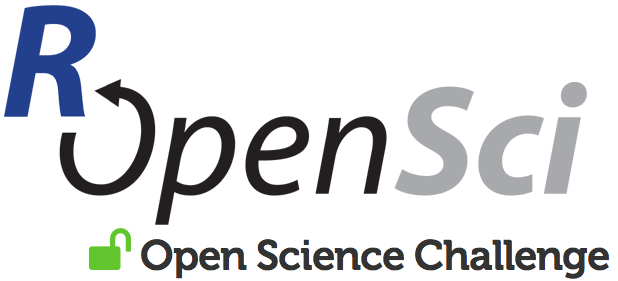BMC Ecology recently caught up with ROpenSci – a collaborative effort to develop R-based tools for facilitating Open Science. In this guest blog they discuss a new open data challenge that they have launched, to help encourage more researchers to make their data and software available to all.
We’ve all been there. A new and exciting paper comes across our screen, and as we read through it, we get excited about all sorts of possibilities. Perhaps the paper describes an exciting dataset that we could bring to bear on our own work, or maybe the paper describes a new method that we’ve been hoping to use. It might be something simpler, like a really amazing figure that we’d like to reproduce with our own data. But this excitement doesn’t last long when you realize that the authors have not made their data or the code they used for analysis and visualization publicly available. At this point you might consider emailing the authors, but that route may not be fruitful as others have discovered (Wolkovich et al, 2012). Sound familiar? You’re not alone.
A great many of us are also frustrated by the lack of data and code accompanying published papers. Access to such artifacts makes it possible for others to validate your findings, replicate the results, and build novel ideas upon this body of work. Sharing your data can also lead to more citations (Piwowar et al, 2007) and increased opportunities for collaborations. These are the reasons why a handful of ecologists got together to begin rOpenSci – a collective aimed at making it easier to access existing ecological and environmental data through open source software. By showcasing opportunities and possibilities that already exist with the limited data that’s out there, we hope to encourage more scientists to share their data and support organizations and agencies that make such resources available.
In an effort to encourage more ecologists to take advantage of existing datasets and share their own, we have recently launched an Open Science Challenge. You propose a research project (or enhance an existing effort) involving one or more of our R packages, and our team will provide you with all the support you’ll need to complete and publish the work.
What kinds of things are we looking for? Though we don’t have anything specific in mind, here are some use cases that you may find yourself in. Use case 1: You are writing a paper in which you are collecting occurrence data for a set of species from GBIF. You can use our rgbif package to get data within R. In addition, you can check your species names to make sure they are up to date using our taxize package. Use case 2: Perhaps you are writing a paper that asks questions about altmetrics. You can use our rAltmetric and rImpactStory packages to gather altmetrics data on papers. In both use cases, and any others you come up with, we can help you use the packages, rapidly address any problems you have, add new features you suggest, and help you make your research reproducible.
To apply, send an email to info@ropensci.org with the subject “rOpenSci Open Science Challenge”. The deadline is January 31, 2013. Get your entries in now!
References
Piwowar, H.A., Day, R.S. & Fridsma, B. (2007). Sharing Detailed Research Data Is Associated with Increased Citation Rate. PLOS One.
Wolkovich, E.M., Regetz, J. & O’Connor, M.I. (2012). Advances in global change research require open science by individual researchers. Global Change Biology, 18, 2102–2110.

Comments